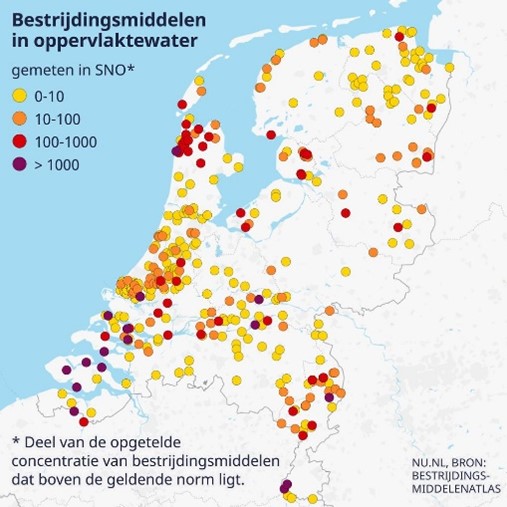Farmers' health at risk from large cocktail of agricultural poisons

Accumulating agricultural toxins
About 40 % of Dutch farmland is contaminated with fertilisers such as nitrogen and phosphate. But there is more, experts from the Wageningen University and Research (WUR) and Radboud UMC say in an interview with the Dutch news site NU.nl: there is also a widespread pollution with pesticides. A European study show that agricultural toxins are accumulating not only in the soil, but also in farm houses and in people.
Tip of the iceberg
In the homes of Dutch farmers, researchers found a total of 144 different pesticides in house dust. "This is on the high side compared to other European countries," says WUR soil physics professor Violette Geissen. "The concentration of pesticides in other environmental compartments is also above average." Moreover, the figures may be an underestimation, Geissen adds, as only 207 of the 500 pesticides available on the European market were tested.
Health at risk
However, the consequences can be significant, especially for farmers themselves. According to the European Food Safety Authority (EFSA), of the agents found in household dust, 40 % are "possibly or definitely" carcinogenic. Furthermore, 33 % of the agents are potentially endocrine disruptors and 63 % can affect fertility or lead to abnormalities in unborn children. Dutch and international studies have also shown that pesticide use can be linked to the brain diseases Parkinson's and Alzheimer's, leukaemia and the muscle disease ALS. Bas Bloem (neurologist at Radboud UMC) is eagerly awaiting the results from a study on Parkinson's disease conducted in the so-called “Bulb Region” as in flower bulb cultivation, proportionally most pesticides are used.
Pesticide cocktail: more than the sum of its individual parts
Both researchers are concerned as current health standards are set for each pesticide individually. This makes it possible to stay below the standard for every individual agent, whereas the effect of a cocktail of pesticides is believed to be even worse than the sum of the individual parts. EFSA is now investigating whether current pesticide authorisation policy is inadequate.
The complete article (in Dutch) can be read on the Dutch news site nu.nl . More info on the research done by Prof. Violette Geissen can be found on the site of Wageningen University and Research. During the second series of EmConSoil webinars, Violette Geissen brought a presentation on her research; the video of this webinar is available on Youtube.
EmConSoil coordinator
- Address
- Stationsstraat 110
2800 Mechelen
Route and accessibility - Telephone
- +32 15 284 284
